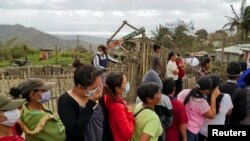An explosive eruption of the Philippines' restive Taal volcano no longer appears imminent, authorities said Sunday as they lifted most of a mass evacuation order but warned residents to remain ready to flee.
Warning signs like earthquakes have been steadily waning since Taal burst to life two weeks ago with plumes of ash and lava, forcing over 135,000 people into shelters over fears a massive blast was coming.
The nation's seismological agency said steadily shrinking ash and gas emissions were signs of "decreased tendency towards hazardous explosive eruption," leading them to drop the alert by a notch.
The immediate impact of the reduced warning was the lifting of the evacuation order for nearly all the towns that ring the volcano, a tourist attraction that sits in the middle of a lake.
"Residents of all towns under lockdown except Agoncillo and Laurel now have the option to return," local governor Hermilando Mandanas told a press conference.
"There's a possibility that the volcano may still erupt and we should still be ready to evacuate in one hour."
No one is known to have died in the eruption, but the ash it unleashed forced the brief closure of the capital's main international airport, stranding tens of thousands of travelers.
The volcano shot ash 15 kilometers (nine miles) high and spewed lava in the January 12 eruption, which crushed scores of homes and killed livestock as well as crops.
However, seismologists warned the volcano could unleash a much bigger eruption "within hours to days," posing a deadly risk to anyone in a 14-kilometer radius "danger zone."
The volcano island is still under evacuation orders, and the thousands who lived there will not be allowed to return, the government has said.
'Not really afraid'
Taal, located just 60 kilometers from the capital Manila, is one of the most active volcanoes in a country where eruptions and earthquakes are a dangerous part of life.
Its last eruption was in 1977, but it has a long history of activity. In 1965, a Taal eruption killed some 200 people.
Despite the risks that the volcano erupt could again erupt, many residents were eager to return home.
"That's where we were born, including my ancestors... so we are determined to go back," said Ronald Humarang, a 32-year-old factory worker.
"I am not really afraid [of an explosion] because during the initial eruption, we didn't evacuate our house immediately," he told AFP.








